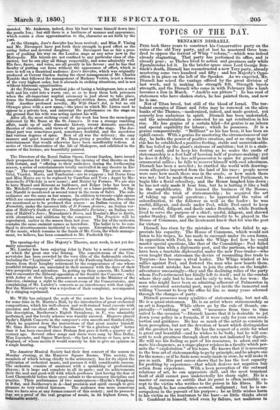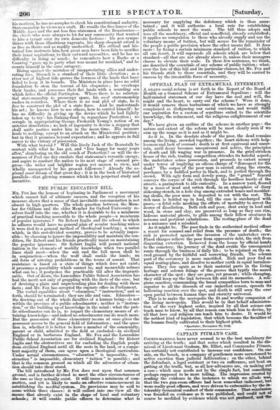TOPICS OF THE DAY.
BENJAMIN DISR A KU.
PEEL took three years to construct his Conservative party on the rains of the old Tory party, and at last he mustered three hun- dred to oppose the torrent of Whig "reform,"—which was indeed already stagnating. That party has performed its office, and is already gone • as Thebes lived to action and greatness only while Epammonda; led it. In the briefer space since Lord George Ben- tinck's death, Disraeli has reconstructed a new Tory party, already mustering some two hundred and fifty; and her Majesty's Oppo- sition is in place on the left of the Speaker. As we expected, Disraeli has seized the vantage offered by the great division of last week, and is snaking his strength felt. Strength breeds strength, and the Disraeli who came in with February like a lamb becomes a lion in March. " Anchlo son pittore " : he has read of statesmen who have shaken states, he has painted them, and now he is one.
Not of Titan breed, but still of the blood of Israel. The tur- bulent energies of Zip:in and Jehu may be renewed on the alien banks of the Thames,—modernized, indeed, and made genteel, yet scarcely less audacious in spirit. Disraeli has been underrated, and the miscalculation is corrected by an apt retribution in his rise. He has genius of a certain kind—for genius is an inborn and special capability for labour; which he possesses. It is a genius comparatively. "Brilliant" as his has been, it has been an uphill career. With a genius for mastering the circumstances of our day, he lacks the power of positive creation, and at no stage in his rise has he established a positive footing, stable and unmistakeable. He has toiled up the giant's staircase of ambition; but it is a stair- case of sand, and to -keep his footing as he scales the castle of statesmanship is a feat half of heroism half of posture-making • yet he does it deftly; he has self-possession to spare for graceful and ornamental sallies ; he falls to recover himself with cool adroitness. Disraeli has been a novelist ; he startled the world with drawing- room allegories imported from the land of his race : people never were sure how much there was in the oracle, or how much there was not ; but he made them read him. He entered Parliament, to begin like a florid schoolboy, and. the House laughed him down : he has not only made it hear him, but he is baiting it like a bull in the amphitheatre. He learned the business of the House; he studied the trick of statesmanship ; he acquired the art of taking up special questions ; he appreciated the value of subordination, to the follower as well as the leader : he was useful, diligent, and docile under Peel, while Peel cared to keep him ; useful, diligent, and docile under Bentinck, while Boutin& lived to serve the purpose of a chief; useful, diligent, and shrewd under Stanley, tiff the game was manifestly to be his in the House of Commons, and the lieutenant knew that hts was the post for -victory. Disraeli has risen by the mistakes of those who failed to ap- preciate his capacity. The House of Commons which would not listen to his tropes, he has made to succumb under its own forms. In opposition with Peel, he made the .Whigs feel how he could master special questions, like that of the Consulships: Peel failed to secure him with a diplomatic post, and the partisan, who might have been a tractable diplomatist under the new Free-trader—who even taught that statesman the device of reconciling free trade to Toryism—has become a rival leader. The Whigs winked at his salhes against Peel, and fostered the man who now beards them. Their second mistake has been to join the attacks on the knight- adventurer unceasingly—they and the declining relies of the party whom Peel's retirement has fatally left to itself; and in the combat where they only had to lose and he only to -win, he has won: the man who might have been an admiring adherent of Palmerston in some contented secretarial post, may yet invite the immortal and willing Viscount to keep the office he has so many years adorned through the changes of party. Disraeli possesses many qualities of statesmanship, but not all. He is a quasi-statesman. He is an artist where statesmanship as an art is forgotten. While others go by the rule of thumb, em- pirically—" rubbing on" with "measures from time to time suited to the occasion "—Disraeli knows that it is desirable to jot down your policy in a formula, if it were only for your own recol- lection and guidance. He has so much of the artist as consists in keen perception, but not the devotion of heart which distinguishes all the greatest in any art. He has the respect of a critic for what is great and beautiful—and he wishes to be both; but he will con- sent to seek greatness through short cuts not indicated by dignity. He will use his feeling as part of his resources, to adorn and ani- mate his eloquence as a stage-player rejoices in a faculty which per- mits the " exploitation " of his tears. He knows that it is necessary to the true art of statesmanship to go by principle, and he adopts one for the nonce; or if he finds none ready-made in store, he will make it pro re nati. His past career shows that he has the best capacity for profiting by experience—that which derives not negation but action from experience. With a keen perception of the outward relations of art, he can appreciate sill, and the most transient fault of skill cannot pass undetectedly his sharp sight. He is a master of sarcasm so subtile that its point is often invisible ex- cept to the victim who writhes to the poison in his fibres. He is not, though he has sometimes seemed, malignant ; but he is un- scrupulous in the pursuit of his purpose ; he as little wishes harm to his victim as the huntsman to the hare—as little thinks about it. Confident in himself, tried even by failure, not malicious in his motives; he has no scruples to check his constitutional audacity. Statesmanship he views as a craft. He recalls the free lances of the Middle Ages and the not less free statesmen of the Renaissance— the chiefs who were always to let for any community that wanted to hire a tyrant over its own domestic factions : his pen sympa- thizes with those illustrious vagrants, his sharp eloquent sword is as free as theirs and as readily unsheathed. 'His critical and his- torical lore instructs him -how great men have been fain to sacrifice their inner aspirationS. to-their outward necessities, and he has no difficulty in -doing as' much: he remembers how a Burke or a Canninggave up to party what was meant for mankind," and he counts hi gpif in the same category. Rising against the mistakes of unappreciating allies and under- rating foes, Disraeli is a standard of their little elevation ; as a river not of highest tide proves the lowness of the lands that have failed to keep it in beim& The Ministers in place have no solid foundation to stem the torrent of his eloquence ; he overleaps their banks, and possesses their at lands with a sounding sea which defies the official Piutington. Where there is no substan- tial statesmanship to preoccupy space, his as-if statesmanship rushes in resistless. -Where there is no real plot of state, he is free to construct the plot of a state farce. And he understands his art ; he knows how to use others, how to control himself: he has no difficulty in giving up the device which he had lightly taken up to try—his Sinking-fund to repurchase Protection ; no scruple in appropriating George Frederick Young's notion of an anterior dissolution ; no lank of ingenuity to devise a stopgap that shall anife parties under him in the mean time. His measure leads to nothing, except to an attack on the Ministerial position ; but in that it promises beyond expectation ; and he appears in full career to the victory of possession. With what beyond ? Will this lively jack of the Beanstalk be content with what he has got, and "live happy for many years after," slumbering on the old couch of Protection? or will the de- nouncer of Peel one day emulate that statesman's versatile energy, and aspire to conduct the nation to its next stage of onward pro- gress—the wider and brighter region yet unseen to view, and wholly unsuspected by his present followers ? Already the as- pirant must dream of that great day:: it is in the book of -historical parallels—that glowing romance which is his perpetual study and incentive.

























 Previous page
Previous page